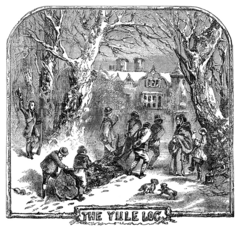Yule
| Yule | |
|---|---|

Hauling a Yule log at Christmas, 1832
|
|
| Also called | Yuletide, Yulefest |
| Observed by | Various Northern Europeans, Neopagans, Unitarian Universalists |
| Type | Cultural, Germanic Pagan then Christian, secular, contemporary Paganism |
| Significance | Winter Festival |
| Date | winter solstice |
| Frequency | annual |
| Related to | Winter solstice (Midwinter), Christmastide, quarter days, Wheel of the Year, Winter festivals, Christmas |
Yule or Yuletide ("Yule time") is a festival observed by the historical Germanic peoples. Scholars have connected the celebration to the Wild Hunt, the god Odin, and the pagan Anglo-Saxon Mōdraniht. It later underwent Christianised reformulation resulting in the term Christmastide.
Terms with an etymological equivalent to Yule are used in the Nordic countries for Christmas with its religious rites, but also for the holidays of this season. Today Yule is also used to a lesser extent in the English-speaking world as a synonym for Christmas. Present day Christmas customs such as the Yule log, Yule goat, Yule boar, Yule singing, and others stem from pagan Yule. Today the event is celebrated in Heathenry and some other forms of Modern Paganism.
Yule is the modern English representation of the Old English words ġéol or ġéohol and ġéola or ġéoli, with the former indicating the 12-day festival of "Yule" (later: "Christmastide") and the latter indicating the month of "Yule", whereby ǽrra ġéola referred to the period before the Yule festival (December) and æftera ġéola referred to the period after Yule (January). Both words are thought to be derived from Common Germanic *jeχʷla-, and are cognate with Gothic (fruma) jiuleis; Old Norse, Icelandic, and Faroese jól; Danish, Swedish, and Norwegian jul and ýlir. The etymological pedigree of the word, however, remains uncertain, though numerous speculative attempts have been made to find Indo-European cognates outside the Germanic group, too. The noun Yuletide is first attested from around 1475.
...
Wikipedia
